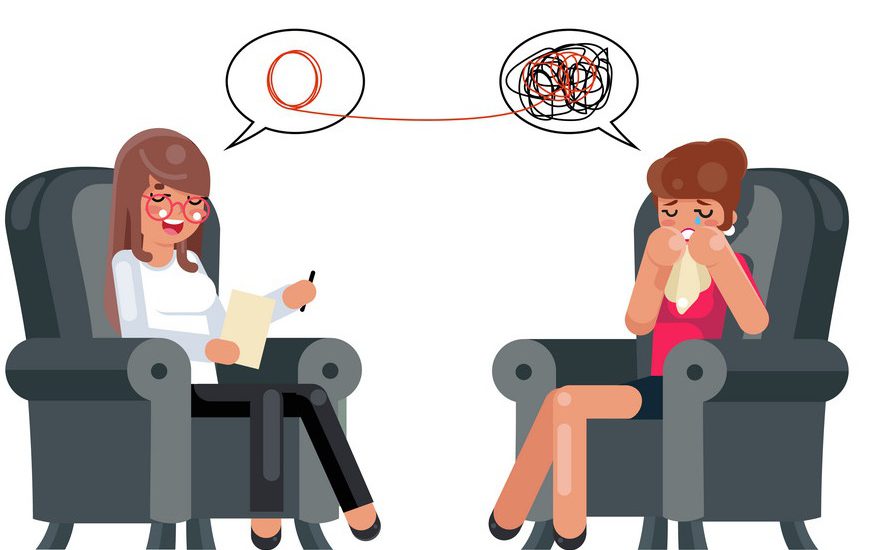A certain percentage of people are instilled with the belief that something is seriously wrong with people who turn to a psychologist. In order to maintain an image of themselves as a healthy and normal person at all costs in their own eyes and the eyes of others, they often shy away from psychologists and even certain psychological advice. Even when at some point in life they find themselves on the sidelines, when they feel weak and helpless, when they go through insecure periods of life, change or find themselves overwhelmed by anxiety or panic, they do everything to keep other people from noticing their condition, because they have this irational belief that any intense discomfort they feel is a signal that they are “crazy”, “disturbed” and that they need to hide it.
There are several prejudices that accompany this pattern of behavior, and some of them are:
1. One of the most common prejudices is that a psychologist and a psychiatrist are one and the same. Psychologists are not psychiatrists. Psychologists completed their studies at different faculties from psychiatrysts. Psychologists as well as psychiatrists who specialize in psychiatry after medical faculty have the same subject of study (man, his psyche), but through working with people they approach it in different ways. Psychiatrists have the basic task of diagnosing and giving adequate medical treatment, and if they are trained in psychotherapy by attending long-term psychotherapy courses, they will be able to provide people with support through conversation, psychotherapy and monitoring the condition of clients. Psychologists, on the other hand, although they can work with psychiatrists and participate in giving a diagnosis, do not issue prescription drugs to people: the primary way they work with people is through conversation, analysis of the whole life situation, goal setting and support on the way to change.
2. The next widespread prejudice is that psychologists work exclusively with mentally disturbed or sick people. Psychologists work with both healthy population and the population that has certain disorders. Psychologists will therefore often work in a field of prevention of disorders and diseases by promoting healthy behaviors and giving people advice on how they can nurture and preserve their mental and physical health. On the other hand, we will often see psychologists in schools, kindergartens, nursing homes, hospitals, private institutions, companies and offices. In addition to psychology studies, psychologists can additionally educate and attend various long-term psychotherapy courses in order to have the right to work independently in the office or engage in psychotherapy (psychoanalysis, transactional analysis, REBT, NLP, gestalt therapy, etc.)
3. The third prejudice is that mental problems can be “solved” in an easy way, “overnight”. Well, it is not uncommon for people to resort to medication just to “feel better” at the moment. Or they go to an astrologist or someone else, so to speak, a helper or therapist who, they believe, will help solve the problem without much of their personal involvement. Often people, due to fear of psychologists, tend to engage in various hedonistic behaviors (consuming sweets, alcohol and cigarette, get involved in frequent consumption, investing in an outward appearance that can get out of control), which may bring immediate profit, current positive emotion, but in the long run, those behaviours don’t help with problems that last a long time. The problem with such elections is that the focus on solving the internal problem is placed somewhere outside, which in the long run, rarely leads to satisfaction. On the contrary, hedonism that gets out of control can lead to additional problems and addictive behaviors. So, we cannot solve psychological problems quickly and easily, we need to work on them for a certain period of time, in order to become aware of our inner life and learn to take responsible control over it.
What does working with a psychologist then looks like?
A psychologist can provide different types of services. He or she can work with children, individuals, couples or groups of people, online or face to face. The time spent working with a psychologist varies from one-time interventions and short-term help (one session from time to time, as needed or before or after a critical and important event) to long-term work with clients. The most common type of work with a psychologist is through psychological counseling, which has its own plan and program, and the duration lasts an average of 10 sessions, once a week, lasting 1 or 2 hours.
At the first session, the client and the psychologist meet, and the psychologist takes some basic information from the client (name, year of birth, contact) and tries to shape the reason for the client’s appearance into what is called a problem: unwanted condition. Already in the first, although most often in the second session, the client and the psychologist defined one, two, or even three unwanted states (eg. low self-confidence, which entails insecurity in relationships with people, and which affects the third problem, and that is panic and anxiety during public appearances) and in accordance with them, and the desired conditions, fix goals of work. Sometimes we move according to the plan from the unwanted to the desired state, and sometimes the client simply has a natural and human need to “ventilate”, to talk and have someone who listen to him, someone to simply “be there”. The psychologist does not treat, does not intervene, does not change people during the sessions. As an neutral person, the psychologist is there to objectively assess the client’s situation and to ask various questions to see his or hers own distorted patterns, beliefs, behaviors and emotions, as well as to draw conclusions, new decisions and gradually change clients daily habits. The client receives tasks between sessions (to write down thoughts, behaviors, emotions or reactions and to gradually change them), and in each of the sessions, in accordance with the problem, different topics of importance are passed: we learn to recognize and remove various rigid beliefs and prohibitions, we learn to relax through relaxation techniques, we learn to give ourselves and others psychological permissions, we learn what our life rights are, we learn to recognize our own ego, we strengthen self-confidence, we learn positive emotions, we develop healthy behaviors, we learn and develop cheerfulness and gratitude, we learn how to be ok with other people, not to react violently, as well as to oppose those behaviors that we do not like in other people, learn how to adapt and achieve balance, learn flexibility and tolerance, learn how to overcome our unpleasant emotions.
We work on ourselves and experience changes that are beginning to have positive effects on our lives, health and relationships with other people.

